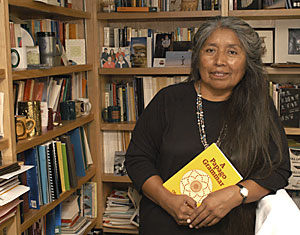 |
|
photo courtesy of Arizona theatre company
|
Ofelia Zepeda is trying to bring long-overdue recognition to Native American poetry. She will host Hi-Tea at the Poetry Center this Monday as part of the effort.
|
|
|
By Kylee Dawson
Arizona Daily Wildcat
Thursday, October 14, 2004
Print this
If language were a line of defense, poetry would be the primary weapon. For centuries, the spoken word has played an important role in the survival of many cultures.
Ofelia Zepeda hopes to keep such a tradition alive by revitalizing American Indian languages, particularly in Arizona.
To help her spread the word, the UA Poetry Center is hosting the second Hi-Tea on Monday, where Zepeda will lead a lecture on Native languages and a poetry reading in both Tohono O'odham and English.
Curated by Jason Zuzga, a UA creative writing masters student, the Hi-Tea is the second monthly event.
As an alumna and UA linguistics professor, Zepeda developed the first Tohono O'odham course ever offered at the UA.
At the Hi-Tea, she will teach audience members about native languages, and also instruct them about the basics of Tohono O'odham and its use in poetry.
"We have considerable language loss among tribal groups in Arizona," Zepeda said.
This generation and a few generations in some cases are not speaking their native languages, particularly amongst those 20 years old and under, Zepeda said.
There are a series of contributing factors to the language loss, including the most primary: contact with European cultures, which led to the extermination of some cultures, particularly those near the Atlantic Ocean.
More contemporary problems include the influence of education and institutionalized religions, which have cut off several indigenous peoples from speaking their native languages.
"All of those things are part of American history," Zepeda said.
A lot of people also blame technology, especially television.
Children do not grow up speaking their native language because both of their parents are working. But when parents do come home, the television remains on.
Zepeda hopes her talk will help people understand the current situation of American Indian languages and also learn about what is being done to preserve and revitalize these languages.
She will discuss some of the programs that various tribal cultures have used to preserve their native languages. One successful tool has been the creation and use of poetry in native languages by native poets.
Some of Zepeda's favorite poets are from the Southwest and have similar backgrounds to her own and write about the similar themes that reflect Zepeda's own life as an indigenous woman.
Poet Luci Tapahonso, a UA professor of English and American Indian Studies, is from the Navajo Nation and has written several poems and stories published by the University of Arizona Press.
Another favorite of Zepeda is poet Simon Ortiz, of the Pueblo nation in Acoma, N.M., who writes about American Indian issues, including political issues.
Zepeda's dedication to preserving native languages extends beyond poetry.
This summer marked the 25th anniversary of the American Indian Language Development Institute, the first organization of its kind in the United States.
With a bilingual curriculum and several courses in linguistics and creative writing, the purpose of the AILDI is to help and teach educators of American Indian students.
"Our participants are predominantly native peoples who work in language spoken in, for instance, high schools of the native population," Zepeda said.
Co-founded by Zepeda, who serves as the institute's director, the AILDI has been modeled by several universities in the United States and Canada.
Zepeda is also the editor of Sun Tracks, a book series of literary works by American Indian writers, which is published by the University of Arizona Press.
"Mat hekid o ju: 'O'odham Na-cegitodag" ("When It Rains: Papago and Pima Poetry"), a collection of student poems, was the first book published in the series in 1982, while Zepeda was a grad student.
The poems are in Tohono O'odham with English translations and were written by students from the first Tohono O'odham course offered at the UA.
Even with English translations, Zepeda said the University of Arizona Press was reluctant to print the book because it was in Tohono O'odham. But the book sold out quickly.
"I think it was O'odhams who bought it," Zepeda laughed.
Zepeda has since written two books of poetry of her own, including "Ocean Power: Poems from the Desert," and "Jewed 'I-hoi" ("Earth Movements").
She also co-edited "Home Places: Contemporary Native American Writings from Sun Tracks."
The Hi-Tea will be at the Poetry Center Conference Room at 5:30 p.m. Admission is free. Hot tea and other refreshments will be served.
The Poetry Center is located at 1600 E. First St. on the southeast corner of First Street and Cherry Avenue.
